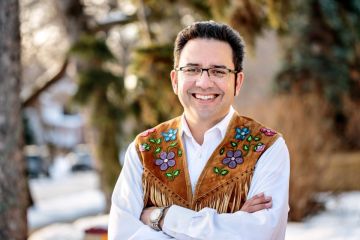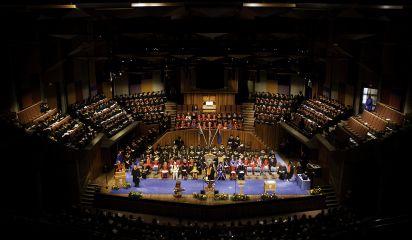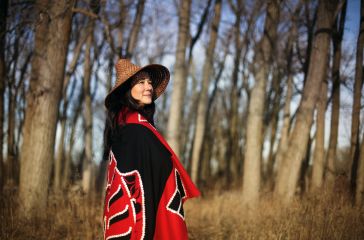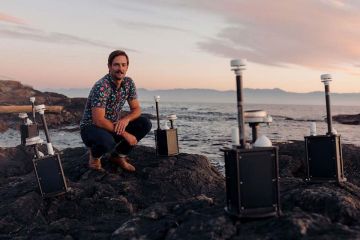Law and the land
- Jenny Manzer
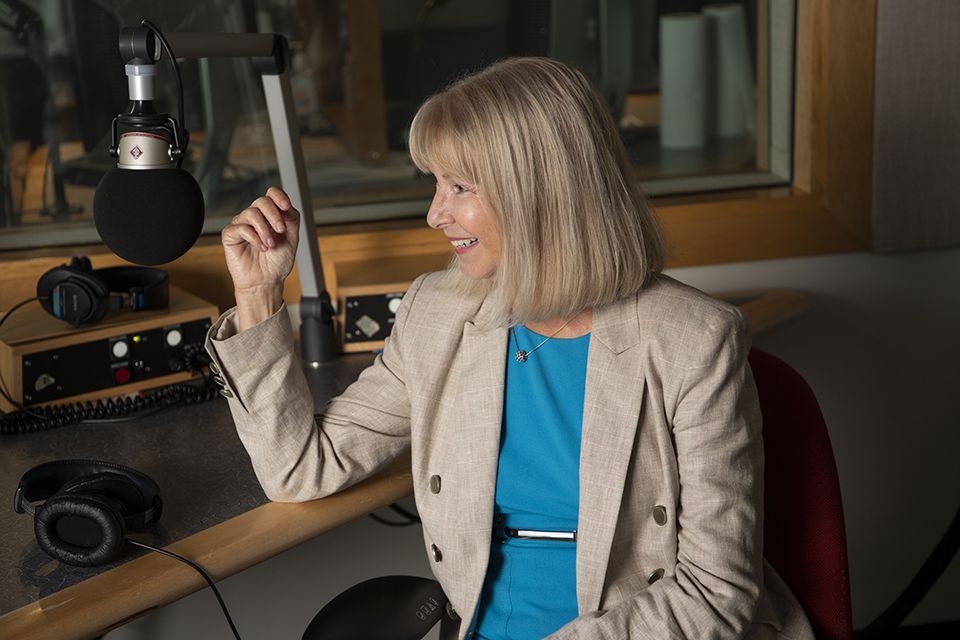
CBC journalist Laura Lynch (LLB ’88) uses her legal knowledge to tackle the most pressing stories of our time, from Supreme Court cases to climate change to the devastation of war.
It was a beautiful, bright day in September. Laura Lynch bicycled to her office at the press building in Washington, DC, where she served as a CBC foreign correspondent.
“I looked up at the bank of televisions, and I saw one of the towers in New York on fire, and I thought, ‘Oh, it’s going to be a long day.’ And then I went upstairs to my office and the second tower got hit, and we were on the air for the next… I don’t know how long…”
Lynch and the CBC team stayed on the air for 48 hours, long through the night, reporting on the aftermath of 9-11, the terrorist attack that shook the foundations of the world. “When I finally went home, I broke down in tears from the whole overwhelming experience,” Lynch recalls. Covering the story dominated her time in Washington.
Throughout her career, she has had a tendency to take on tough subjects. Lynch began her reporting career for the CBC in Ottawa, covering the Supreme Court, including emerging case law on the Charter of Rights. “Oh my god, it was so much fun. I really felt as if I had landed in clover.”
Lynch, who grew up in North Vancouver, earned a degree in journalism at Carleton University in 1983 before studying law at UVic to gain expertise in legal reporting. The synergy of skills meant she knew how to craft a story and how the law works. “The ability to tell a story, I think that informed my legal work at law school and vice versa… being able to see a story from three sides or four sides, you have to do that when you’re preparing a case.”
Lynch is drawn to controversial, complex stories.
Throughout my career, I have always savoured stories that have a legal angle. I’ll wade right in where others might not, because I feel so comfortable in that area. I can speak the language that lawyers speak. I think that’s intimidating to some people, and it’s not for me.”
—UVic law grad and CBC journalist Laura Lynch
She loved her classes at UVic, making strong connections. The late Dr. Joe Arvay, who holds an honorary Doctor of Laws from UVic, taught her charter law and later became a cherished friend and mentor. When she was articling with the BC government, Lynch worked on a case with Arvay. “He’s meant a lot to me over the years,” she reflects. His death in 2020 was heartbreaking to her.
Lynch studied environmental law at UVic with BC politician Murray Rankin and public law with Andrew Petter, the former MLA and past president of Simon Fraser University, as well as taking a course in Indigenous law with Jack Woodward. “All of these classes mean so much to me,” she says.
One of her memorable assignments at law school was to draft a shield law for journalists—a provision Canada does not have to this day. “I still do sometimes get anxiety dreams that are about taking one of the law exams, and I show up and I haven’t studied or haven’t been to class,” she laughs.
Petter, former law dean at UVic, recalls Lynch as a strong student who was a tremendous contributor and intensely engaged in the program. Her real-world experience and perspective as a journalist benefitted the class. Lynch clearly understands how law impacts public policy and is able to draw on her knowledge to help others understand it, too.
Lynch’s mentor, Joe Arvay, exemplified how law can be harnessed as a social instrument—and used it to drive change in Canada, Petter observes. “Laura has used her legal knowledge to drive people’s understanding in a way that is hugely important.”
In 1999, she won a Nieman fellowship to Harvard University to study the history of human rights. The fellowship was a springboard to becoming a foreign correspondent in the US, which involved covering Bush v. Gore—the Supreme Court case that settled the 2000 US presidential election.
Lynch went on to report from London, England in a “firefighting bureau,” meaning she travelled as needed—to Spain for a terrorist bombing, to Scotland for a G7 summit, back to London following an attack on the transit system. Lynch recalls covering the fledgling elections in Ukraine, standing in a freezing Maidan Square with protesters as they fought for democratic processes. In 2007, Lynch went undercover to report on the Zimbabwe election at a time when Western journalists were barred from entering the country.
When she covered war in Afghanistan or Syria, or the insurrection in Mali, Lynch focused on the real people, particularly women, who were suffering. “Just trying to give the world a sense of what it was like for these people who never chose war but were having to live through the violence and destruction and uncertainty of it all. That stays with me still as vivid and vibrant as it ever was.”
She details many close calls, including in Mali—when her team travelled with a French convoy along on a dangerous road. She woke to the sound of explosions from roadside bombs and sheltered in a house riddled with bullet holes. They left just before militants crossed the river to reclaim the contested area.
Petter has followed Lynch’s career over the years, and the two have stayed in touch. As president of SFU in 2016, he recruited Lynch to lead a conversation in front of a live audience on “Big Data, Security and Human Rights” with controversial figure Edward Snowden, who was being streamed in from Moscow.
“She’s an incredible journalist. She’s a very courageous journalist. She’s done international work in the field under very challenging circumstances,” he says. Petter happened to be visiting Lynch and some other colleagues in London when she was called to report on the terrorist bombing in Madrid. “She picks up her bags and she flies to Madrid. She’s fearless as a journalist.”
Of all the stories Lynch has covered, one close to her heart involves a woman from Afghanistan named Shakila Zareen, whose Taliban-connected husband shot her in the face. Zareen almost died several times. “Shakila has obviously suffered physically and mentally, and I have to report in a different way, as a human being, not just a reporter. She’s got a reserve of strength in her.” Zareen’s story was a different experience for Lynch—normally she reports on a subject and then it’s done, but her friendship with Zareen endures. “I’ll never be done with her.”
Lynch knew when she returned from overseas that life might seem flat—which is common for foreign correspondents—so she threw herself into new challenges, including guest hosting flagship CBC radio shows The Current and As it Happens. From there, she decided to scale another big topic.
She now hosts What On Earth, a radio show and podcast about finding solutions to climate change.
She and UVic alumna and senior producer Manusha Janakiram created the program together. Lynch is a big fan of Janakiram. “She’s a natural leader, and I see her rising and rising as high as she wants to go in the corporation. I’m just lucky to have had her for two years,” says Lynch, as Janakiram heads to Toronto for a new role.
What On Earth won a Canadian Journalism Federation Climate Solutions Reporting Award in 2021. In April of this year, it became a weekly hour-long show. Their aim is to inform, offer viable solutions to climate change—and instill some hope. Misinformation isn’t new, Lynch notes, and you have to have a thick skin to deflect the barbs of social media.
I do hear from climate deniers. But from the outset we were not interested in false balance or presenting what some might call the other side. When it comes to climate change we’re very clear: there’s no other side. Climate change is happening, climate change is real, climate change is human caused—that’s the baseline.”
—Laura Lynch
Lynch suggests if she’d become a practising lawyer, as originally planned, she would have been an activist. “I probably would have worked with Joe, because of the kind of cases that he used to tackle. Those would have been right in my wheelhouse. I relish that kind of challenge,” she says. Her determination—and her love of a challenge—has defined her career.
“To me, it’s what I’m here for. It’s nice to have that much certainty about what you do for a living. I feel really lucky… I’m grateful.”
When she’s not working, her lucky life includes hiking, biking and hours of yoga. She grew up at the foot of Grouse Mountain, playing in the forest. She moved from Toronto to North Van in 2016—having never expected to return home to the ocean and mountains. “Surprise, surprise, I’m back where I began,” she laughs.
Photos
In this story
Keywords: alumni, law, journalism, human rights, war
People: Laura Lynch, Joe Arvay, Murray Rankin, Andrew Petter, Jack Woodward
Publication: The Torch


